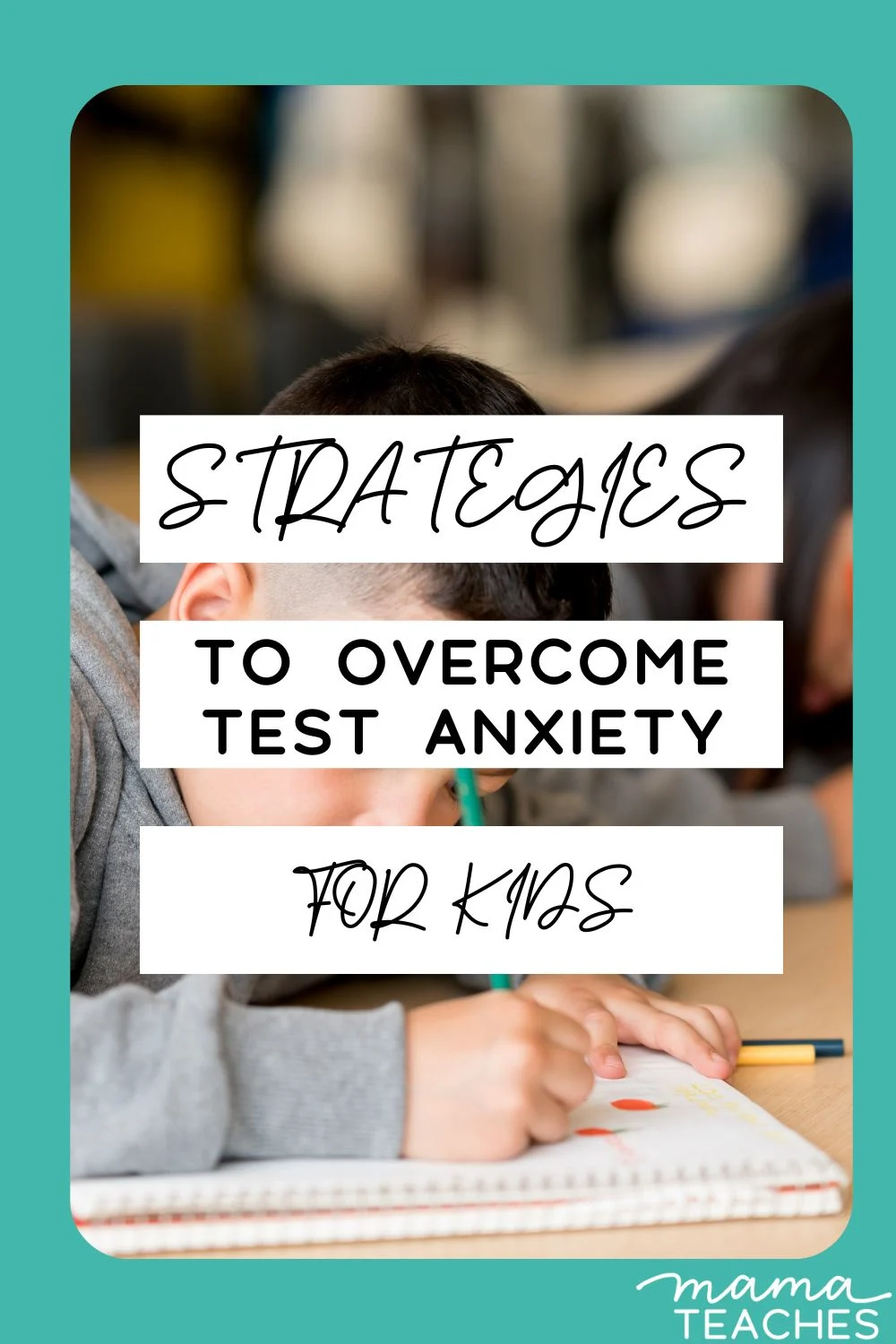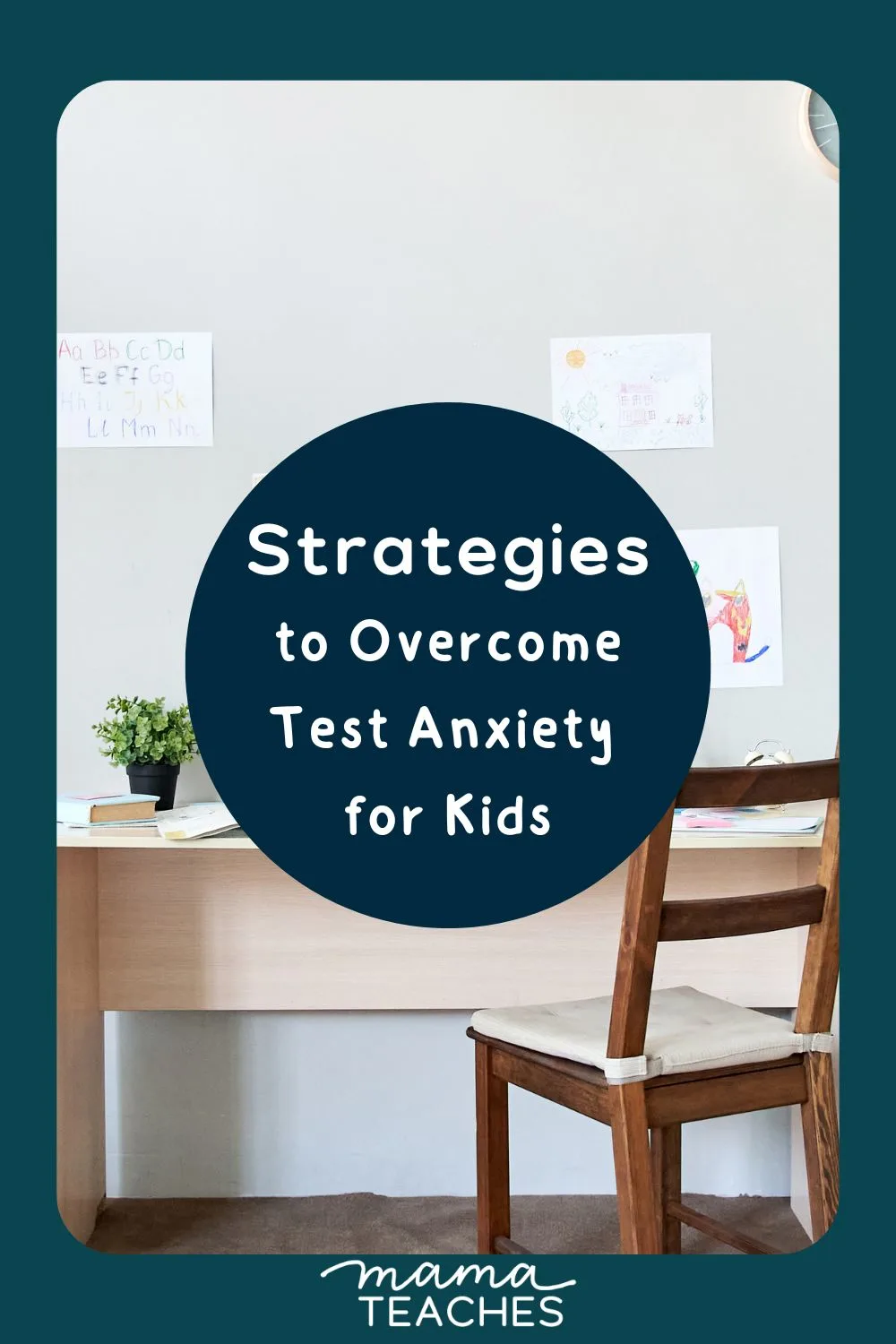Are your kids feeling test-day jitters? Help kids do their best on tests by teaching them these strategies to overcome test anxiety.

What Is Test Anxiety?
Test anxiety is a form of performance anxiety that has physical, emotional, and cognitive symptoms.
Kids may have physical symptoms from test anxiety: racing heart rate, rapid breathing, trembling, sweating, stomach aches, and nausea.
Emotional symptoms of test anxiety include extreme nervousness, feeling overwhelmed, and irritability.
Test anxiety can affect a child’s ability to think clearly. He may experience racing thoughts, an inability to focus, and his mind “going blank.”
You can minimize these symptoms by teaching your child these strategies to overcome test anxiety.

This article contains affiliate links to things that you might like.
The Best Strategies for Overcoming Test Anxiety
These strategies to overcome test anxiety are simple and easy to implement.
Create the Ideal Study Environment
You can minimize test anxiety by ensuring your student is prepared for the test.
One aspect of preparation is study. Does your child have an ideal place to study?
This location should be quiet and as free from distractions as possible.
Give your child a snack before a study session, and keep a water bottle at hand.
Provide the optimal seat for studying (this is different for everyone).
If you find it helpful, play soft music or a soundscape in the background.
Establish a Study Routine
Creating an ideal study environment is only half of the puzzle.
Kids need a study routine. The best test preparation is frequent and consistent.
Teach your child how to break up studying into small, manageable chunks.
Make Studying Fun
Test prep does not have to be boring to be effective. Make learning active!
You can incorporate active learning methods like flashcards, games, interactive activities, and having your student “teach you” or someone else.

Practice the Test Format
Do you know how the test will be structured? Knowing the test format can significantly reduce test anxiety.
Spend some of your review time on questions like the ones he will have on the test.
Teachers are usually happy to tell you if the test is mainly multiple-choice, short-answer, or matching.
Promote a Growth Mindset
Test anxiety can make the negative loom large in a child’s mind.
They may dwell on negative phrases (due to a fixed mindset) such as “I’ll never learn this,” “I’m just not smart enough,” or “I am going to fail.”
Teach children to have a growth mindset. You can begin with this list of growth mindset activities.
Then, they can counteract those negative thoughts with positive ones, such as “I can learn anything I put my mind to,” or “I am prepared for this test so I can do well.”
Celebrate Small Achievements
Perfectionism can make test anxiety blossom. If a child only sees “doing well” as getting 100%, he will likely be miserable.
Instead, focus on the proper perspective. The goal is to learn the material.
That means any learning–no matter how small–is something to celebrate.
Cheer on your child’s effort!

Cultivate a Healthy Lifestyle
The mind-body connection is undeniable. A healthy lifestyle can directly affect test anxiety and performance.
Make sure your child is getting adequate sleep at night. Sleep is when the body regulates hormones (including stress hormones).
A protein-rich meal before a test can help too.
Ensure your child is well-hydrated since dehydration causes cognitive symptoms such as fuzzy thinking and difficulty concentrating.
Be a Sounding Board
When kids experience anxiety, it can help if they have someone to talk to.
Be a listener first and let your child express her feelings.
Sometimes, children experience test anxiety because they feel pressure from parents or teachers.
Talking about their concerns can help clear the air.
Try Aromatherapy
Some children respond well to aromatherapy.
Scents like lavender, chamomile, and bergamot can ease stress before and during tests.

Teach Muscle Tensing
Stretching and yoga are wonderful relaxation tools, but taking a break in the middle of the test is not always possible.
Instead, you can teach your child to tense and release each muscle group while seated during a test.
For example, tense the muscles in your leg for three seconds and then relax them.
Focus on feet, legs, core, hands, arms, and shoulders. This helps reduce muscle tension.
Practice Deep Breathing
Deep breathing can help relax kids during tests.
Teach deep breathing exercises such as “toe breathing.”
Tell your child to focus on her toes and take a slow, deep breath, imagining the breath traveling all the way to his toes.
Another breathing technique is “box breathing.”
Trace a finger along the desk or table in a square shape.
Start in the bottom corner, trace up one side, and inhale for 3 or 4 seconds.
The trace along the top of the box and hold the breath.
Then, trace down the other side of the box as you breathe out.
Then, hold your breath again as you trace along the bottom.

Reducing Test Anxiety in Kids
These strategies to overcome test anxiety can help your kids stay calm and show what they know on tests.
So take a deep, relaxing breath…then incorporate these tips!
